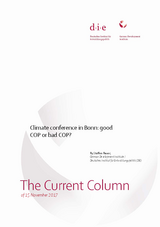The Current Column
Climate conference in Bonn: good COP or bad COP?
Bauer, SteffenThe Current Column (2017)
Bonn: German Development Institute / Deutsches Institut für Entwicklungspolitik (DIE), The Current Column of 14 November 2017
Bonn, 14 November 2017. Two years after adopting the ground-breaking Paris Agreement in December 2015, the UN Climate Change Conference reconvenes in Bonn for COP23 to advice the agreement's implementation. They seek to find ways of increasing their nationally determined contributions in the short term without losing sight of national and international development goals in the process. Concomitantly, COP23 faces the unwelcome task of reassuring the world thatthe Paris Agreement as such is not at stake, in spite of the US' announced withdrawal. The first week of negotiations was encouraging in this respect at least. Spearheaded by former US Vice-President Al Gore, former New York mayor Michael Bloomberg and Hollywood legend Arnold Schwarzenegger, and organised under the hashtag #WeAreStillIn, an exceptionally large attendance of governors and senators from individual US states, mayors of major US cities and influential representatives of US companies and non-governmental organisations demonstrated that US climate policy keeps progressing even without the support of the US President. As one experienced COP delegate from Bangladesh aptly put it at the Development and Climate Days, co-hosted by DIE in Bonn last week, the US President may be turning his back on climate policy, but his people are not. This was noted with gratitude and relief by COP23. Many negotiators from other nations even pitied US colleagues for the plight of being bound to execute the negotiating strategy of the White House. COP23 is primarily expected to agree on a common “rulebook” to guide the implementation of the Paris Agreement. This rulebook is meant to spell out who should take what climate action, by when and with which means as well as how parties should report on their implementation progress in a regular, transparent, comprehensive and comparative manner. After a tenacious first week of negotiations, an agreement appears tangible at the beginning of the second. However, it is by no means certain that any such agreement will actually be reached before heads of state and government fly in on Wednesday and Thursday to applaud the expected progress. Nonetheless, if the corresponding guidelines are to be officially adopted and enter into force at the next climate conference in 2018, COP23 needs to deliver. In case of doubt, heads of government will have to impress the necessary urgency upon their negotiators. If the parties were to keep haggling over the rules beyond the Bonn conference, they risk losing decisive time when it comes to keeping the goal of limiting global warming to a maximum of between 1.5 and 2°C, as enshrined in the Paris Agreement, within reach. Indeed, COP23 would then go down as "bad COP" in international climate policy history. Last but not least, COP23 is making palpable efforts to working out the interconnections between global climate policy and sustainable development. To this end, it is especially important to align the goals of the Paris Agreement with the Sustainable Development Goals (SDGs), which were also adopted by the United Nations in 2015. This is the only way to make inevitable trade-offs visible and the subject of political consideration and priority-setting. After all, climate change and climate policy remain a development challenge. This is all the more true as the foreseeable impacts of climate change are set to undermine existing development gains and to fundamentally call into question the very sustainability of development efforts. Consequently, the Bonn climate conference should also play its part in mobilising more climate finance and, in particular, reach agreement on the future of the UNFCCC's Adaptation Fund. This fund is intended to help developing countries to boost their resilience to and to adapt to the effects of climate change. Yet, these points remain disputed in the ongoing negotiations. Accordingly, there is a need for clear commitments and pledges especially on the part of industrialised nations. Visible progress in stocking up the Adaptation Fund and further advancing the adaptation agenda launched in Paris will define developing countries' assessment of COP23. The remaining items on the negotiation agenda and the conduct of the Trump administration require the remaining key players of global climate policy, namely China and the EU, to demonstrate even greater resolve in leading international climate diplomacy. It should also help the Bonn negotiations and beyond if this understanding would finally establish itself among Germany's political parties that are currently exploring options to form a new coalition government, yet find themselves deeply entrenched over the future of coal and automobile industries.. So far, COP23 waits in vain for a corresponding signal from its Germany, which is indeed at risk of falling spectacularly short of its own emission reduction targets. Hence, Germany's input to the High-Level Segment of COP 23, expected to take place on Wednesday and Thursday, will be noteworthy one way or the other. Ultimately, it may also prove decisive in whether the Bonn climate change conference will be remembered as good COP or bad COP.


